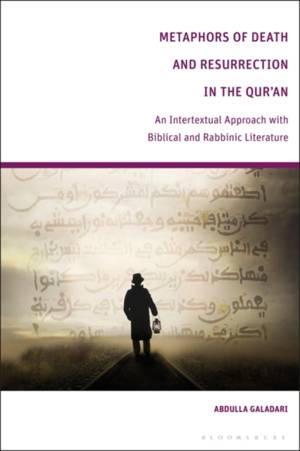
Bedankt voor het vertrouwen het afgelopen jaar! Om jou te bedanken bieden we GRATIS verzending (in België) aan op alles gedurende de hele maand januari.
- Afhalen na 1 uur in een winkel met voorraad
- In januari gratis thuislevering in België
- Ruim aanbod met 7 miljoen producten
Bedankt voor het vertrouwen het afgelopen jaar! Om jou te bedanken bieden we GRATIS verzending (in België) aan op alles gedurende de hele maand januari.
- Afhalen na 1 uur in een winkel met voorraad
- In januari gratis thuislevering in België
- Ruim aanbod met 7 miljoen producten
Zoeken
Metaphors of Death and Resurrection in the Qur'an
An Intertextual Approach with Biblical and Rabbinic Literature
Abdulla Galadari
Paperback | Engels
€ 67,95
+ 135 punten
Uitvoering
Omschrijving
Through extensive textual analysis, this open access book reveals how various passages of the Qur'an define death and resurrection spiritually or metaphorically.
While the Day of Resurrection is a major theme of the Qur'an, resurrection has largely been interpreted as physical, which is defined as bones leaving their graves. However, this book shows that the Qur'an sometimes alludes to death and resurrection in a metaphoric manner - for example, rebuilding a desolate town, typically identified as Jerusalem, and bringing the Israelite exiles back; thus, suggesting awareness and engagement with Jewish liturgy. Many times, the Qur'an even speaks of non-believers as spiritually dead, those who live in this world, but are otherwise zombies.
The author presents an innovative theory of interpretation, contextualizing the Qur'an within Late Antiquity and traces the Qur'anic passages back to their Biblical, extra-biblical and rabbinic subtexts and traditions.
The ebook editions of this book are available open access under a CC BY-NC-ND 4.0 licence onbloomsburycollections.com.
While the Day of Resurrection is a major theme of the Qur'an, resurrection has largely been interpreted as physical, which is defined as bones leaving their graves. However, this book shows that the Qur'an sometimes alludes to death and resurrection in a metaphoric manner - for example, rebuilding a desolate town, typically identified as Jerusalem, and bringing the Israelite exiles back; thus, suggesting awareness and engagement with Jewish liturgy. Many times, the Qur'an even speaks of non-believers as spiritually dead, those who live in this world, but are otherwise zombies.
The author presents an innovative theory of interpretation, contextualizing the Qur'an within Late Antiquity and traces the Qur'anic passages back to their Biblical, extra-biblical and rabbinic subtexts and traditions.
The ebook editions of this book are available open access under a CC BY-NC-ND 4.0 licence onbloomsburycollections.com.
Specificaties
Betrokkenen
- Auteur(s):
- Uitgeverij:
Inhoud
- Aantal bladzijden:
- 272
- Taal:
- Engels
Eigenschappen
- Productcode (EAN):
- 9781350244566
- Verschijningsdatum:
- 20/04/2023
- Uitvoering:
- Paperback
- Formaat:
- Trade paperback (VS)
- Afmetingen:
- 156 mm x 234 mm
- Gewicht:
- 381 g

Alleen bij Standaard Boekhandel
+ 135 punten op je klantenkaart van Standaard Boekhandel
Beoordelingen
We publiceren alleen reviews die voldoen aan de voorwaarden voor reviews. Bekijk onze voorwaarden voor reviews.









